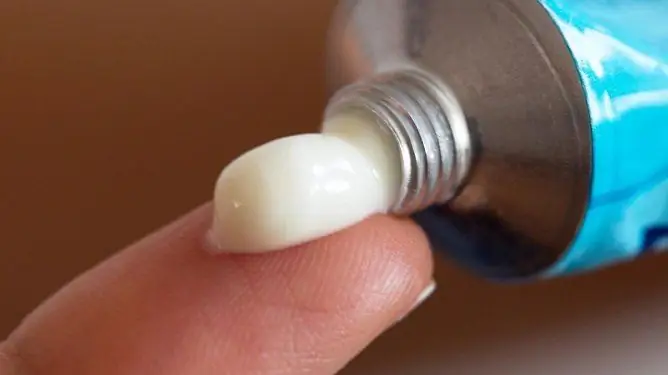- Author Rachel Wainwright wainwright@abchealthonline.com.
- Public 2024-01-15 19:51.
- Last modified 2025-11-02 20:14.
Products that increase testosterone in men: list and recommendations
The content of the article:
- How is testosterone deficiency in women and men
- What foods increase testosterone
- Substances that reduce testosterone production
- Lifestyle change
Testosterone-boosting foods include those that are high in zinc - seafood, fatty fish, liver, seeds, and nuts. Also, for the production of the hormone, vitamins C and group B are needed, contained in fruits, berries, and lean meat. In addition to dietary changes, it is recommended that you lead an active lifestyle and maintain a sleep and wake schedule.
Testosterone is the main male sex hormone responsible for virilization in boys, sperm production, sexual behavior, and the development of muscle and bone mass. Testosterone in the body has two forms - free and associated with protein. The levels of total testosterone in the blood in men depend on the test method and are usually in the range of 8.5-32 nmol / l. Physiological decrease in testosterone levels in men occurs at the age of 50-55 (6.6-25.7 nmol / l). Testosterone also decreases with insufficient physical activity, overweight, hereditary predisposition, hyperglycemia, hypertension, surgical interventions, craniocerebral trauma, infectious and inflammatory processes.
Testosterone plays an important role in the female body, which is not fully understood. However, it has been established that this hormone is necessary for women to maintain bone and muscle mass, regulate sexual behavior and quality of life in general. Studies that assessed the quality of life and sexuality of women with low testosterone levels showed that with the normalization of its level, the general well-being and sexual life of the subjects underwent significant changes for the better. With a sufficient level of testosterone in women, stress resistance increases, the skin retains elasticity, and cognitive ability is maintained at a high level. Testosterone norms in women of childbearing age are 0.38-1.97 nmol / l. The content of the hormone in the blood of women decreases during menopause, after the removal of the ovaries. If a postmenopausal woman takes estrogen medications, testosterone secretion is suppressed even more.
The cause of hormonal imbalance, including a decrease in testosterone levels, can be a diet with the exception of protein foods, fasting. A decrease in testosterone synthesis is noted with Down syndrome, Kallman, Klinefelter, and renal failure.

An unbalanced diet often leads to low testosterone levels
If you suspect an insufficient testosterone content in the body, you should consult a doctor, undergo an examination, and, if necessary, treatment.
How is testosterone deficiency in women and men
With a lack of testosterone in women, the condition of the skin, hair and nails deteriorates, libido decreases, increased fatigue, irritability, anxiety, depression, pain during intercourse, deposition of subcutaneous fat in the lower abdomen, on the arms and neck, and immunity decrease.
With testosterone deficiency in men, weakness in joints and muscles, osteoporosis, weight and / or body temperature increase, mammary glands enlarge (gynecomastia), libido decreases, and infertility may develop.
What foods increase testosterone
For the synthesis of testosterone in the body, zinc is needed - a trace element that prevents the conversion of testosterone into estrogen. Foods that increase testosterone, that is, high in zinc, include seafood, fatty fish, poultry, liver, seeds and nuts, olives, avocados, vegetable oils. Studies show that eating two to three walnuts a day helps to quickly normalize male hormone levels. A particularly useful product that increases testosterone in women are oysters, which contain a large amount of zinc - from 16 mg per 100 g, that is, 100 g of oysters provide the body's daily need for zinc.

Oysters are rich in zinc, which is essential for testosterone synthesis
It is recommended to eat fish and seafood at least three times a week, it is better to steam or bake them. At the same time, the use of salted, dried, canned, fried seafood and fish should be abandoned. Seafood contains not only a large amount of zinc, but also polyunsaturated fatty acids, which also activate testosterone synthesis.
Vitamins of group B and vitamin C are also necessary for the production of testosterone. Products containing them include lean meat (beef, veal, rabbit meat), eggs, cereals (buckwheat, pearl barley, millet, oatmeal), vegetables (asparagus, eggplant, tomatoes, yellow peppers, celery, beets, carrots, zucchini, all types of leafy greens), fruits (melon, papaya, apricot, orange, lemon, persimmon, mango, nectarine, pear, pineapple, bananas, plum, cherry, pomegranate, figs), berries (blueberries, black currants, grapes, cranberries, raspberries, strawberries), dark and light raisins and spices (mustard, cumin, red pepper, turmeric, garlic, cardamom, cumin, coriander).
Fresh fruits and vegetables are more beneficial for the body than frozen, dried or canned, preferably several times a day. It is recommended to eat porridge every day, while it should not be cooked over high heat, it is better to cook it at a temperature not exceeding 60 ° C after pre-soaking the cereal in water.
To get rid of excess estrogen and thus increase testosterone levels in the body naturally, cruciferous vegetables should be included in the diet, which include radishes, turnips, all varieties of cabbage.
Low-fat dairy products (cottage cheese, kefir, yogurt), which are recommended to be consumed every day, also belong to the products that increase testosterone in men and women.
The table below summarizes the major testosterone-boosting foods in men and women.
List of products that increase testosterone:
| Product group | Products | Recommendations for use |
| Fish and seafood | Tuna, salmon, herring, sardine, mackerel, anchovies, perch, halibut, crabs, shellfish, shrimps, oysters | Bake or steam |
| Vegetables, fruits and berries | Radishes, turnips, cabbage, asparagus, eggplant, tomatoes, yellow peppers, celery, beets, carrots, zucchini, avocado, melon, papaya, apricot, orange, lemon, persimmon, mango, nectarine, pear, pineapple, bananas, plum, cherry, pomegranate, blueberries, black currants, grapes, cranberries, raspberries, strawberries | Eat raw or steam |
| Greens | Parsley, green onions, arugula, cilantro, watercress, mustard leaves | Eat raw or add to a meal at the end of cooking |
| Cereals | Buckwheat, pearl barley, oatmeal, millet | Cook at a gentle temperature |
| Meat, poultry | Beef, veal, rabbit, chicken, turkey | Bake or steam |
| Dairy | Low-fat cottage cheese, kefir, yogurt | Consume daily |
If the level of testosterone in the body is low, you should not eat grapefruit. In addition, one should give up alcoholic beverages, limit the use of table salt, black coffee.
Substances that reduce testosterone production
People with low testosterone levels are advised to avoid anthropogenic estrogens, which are found in artificial growth hormones and steroids, pesticides, and plastic dishes. These substances increase the concentration of estrogen and, accordingly, reduce testosterone levels.

People with low testosterone levels should avoid using plastic dishes
For this reason, vegetables and fruits should be thoroughly washed before eating, if possible, choose meat and milk from animals raised in natural conditions, without the use of artificial growth stimulants. In addition, glassware should be used to store food, avoid the use of air fresheners and perfumery products, which contain parabens.
Lifestyle change
A significant part of xenoestrogens accumulates in adipose tissue, therefore, with a low testosterone level, correction of excess body weight is necessary. To increase testosterone levels in the body, you need to get rid of subcutaneous fat, which helps convert testosterone to estrogen.
You can raise testosterone levels by combining diet with exercise (fitness, bodybuilding, etc.). In addition, a night's sleep should be at least 6 consecutive hours. It is recommended to have an active sex life, avoid stressful situations, observe a rational regime of work and rest.
YouTube video related to the article:

Anna Aksenova Medical journalist About the author
Education: 2004-2007 "First Kiev Medical College" specialty "Laboratory Diagnostics".
Found a mistake in the text? Select it and press Ctrl + Enter.






